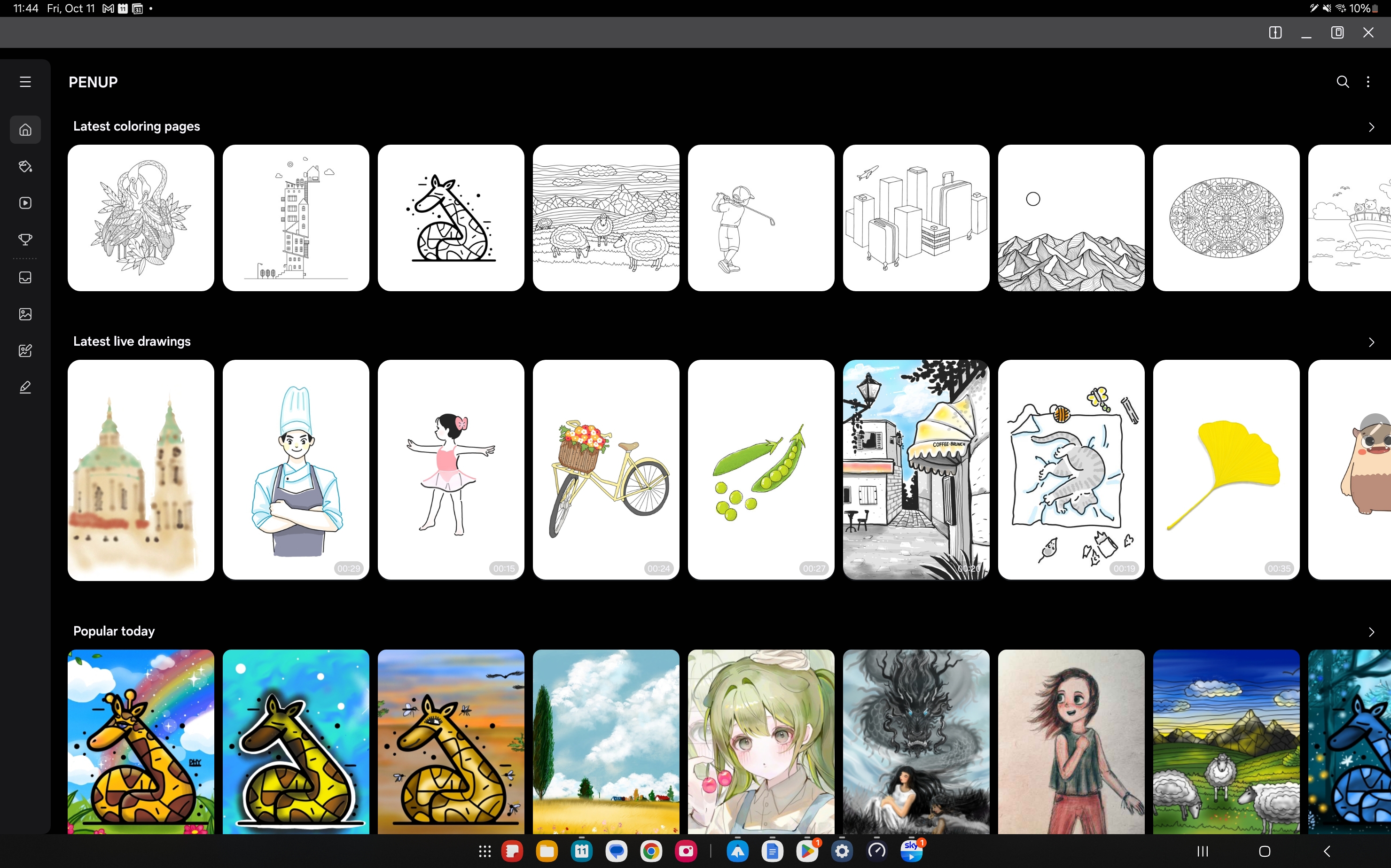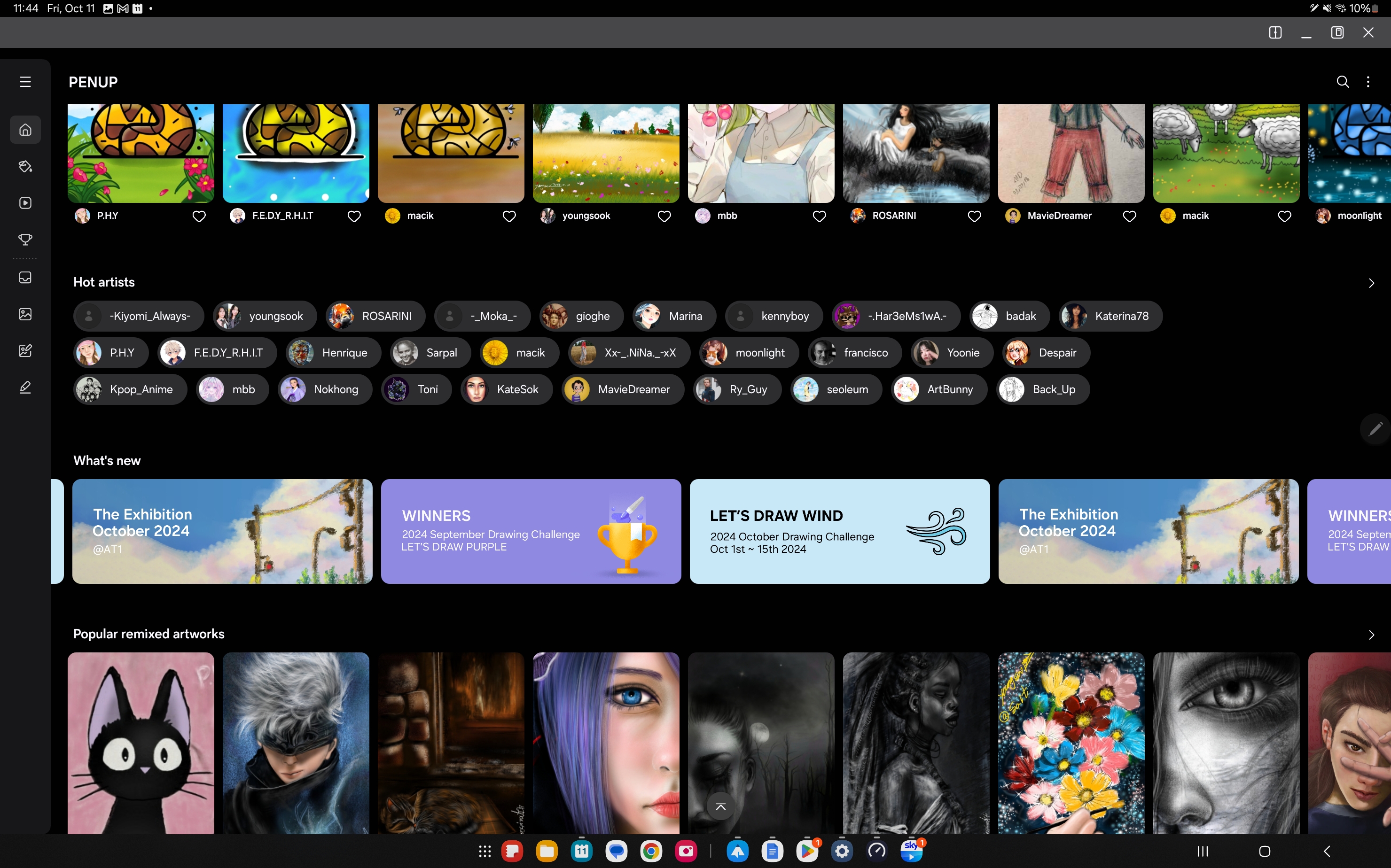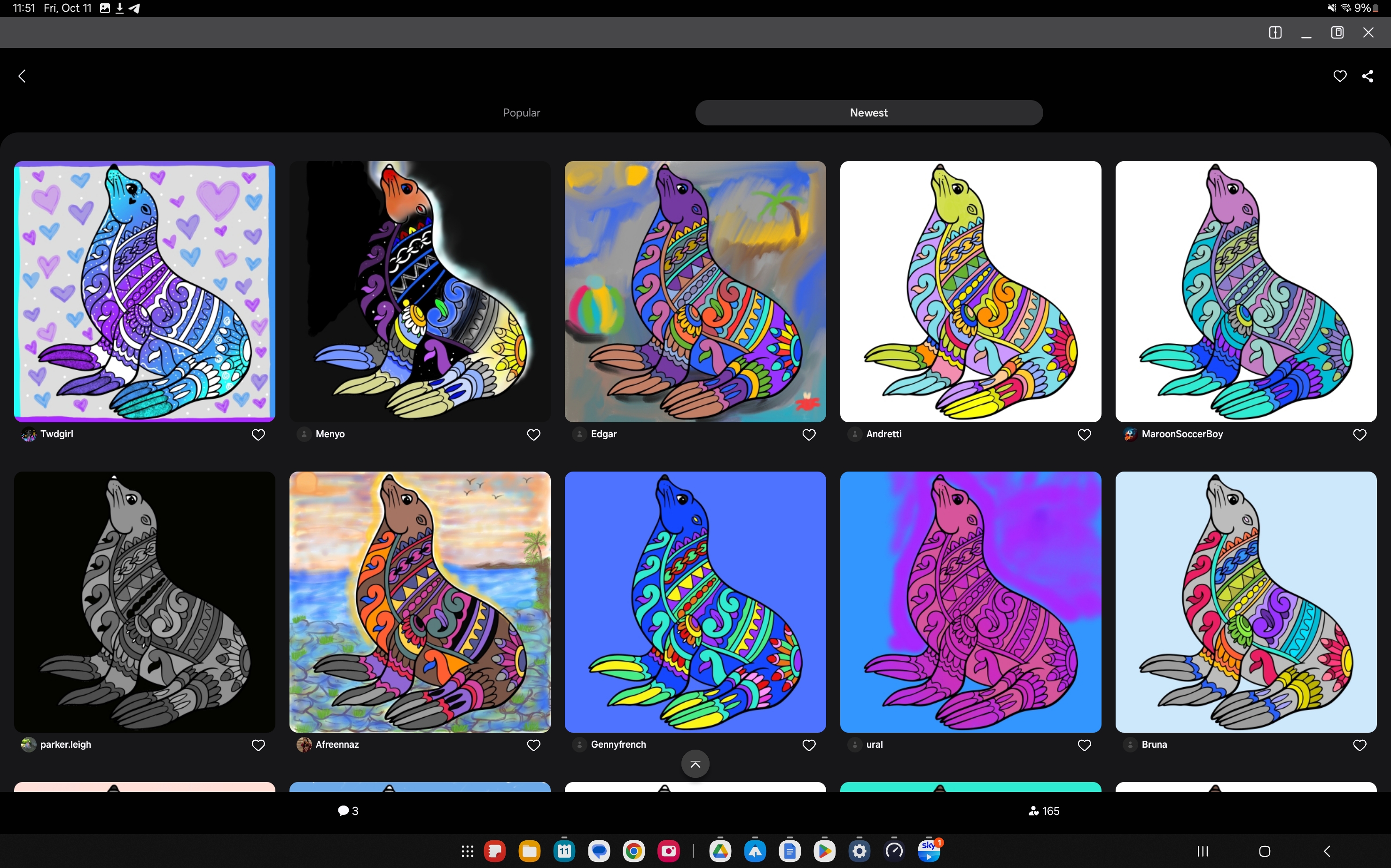- Anti-reflective display tech
- Solid battery life
- Great performance
- Included S Pen
- Some useful Galaxy AI features
- Too big to be portable
- Android is poorly optimized for big screens
- Very, very expensive
Do you need a 14-inch tablet? The size is so popular in laptops that you would think a tablet of the same size could be a hit. After all, bigger is better, no?
That may have been the logic behind the Galaxy Tab S10 Ultra, the third generation of Samsung’s biggest tablet. It’s an accomplished machine that does exactly what you’d expect from an Android tablet and has some nifty tricks to help it masquerade as a computer. Unfortunately, it’s let down by an operating system that limits its usefulness in the same scenarios that you would use it the most.
The result is a great tablet that could be so much better if Samsung had greater influence on the core OS. Android has a big-screen problem, and the Tab S10 Ultra only partially solves it. However, if you can deal with Android’s lingering tablet quirks, there’s a lot to like here.
Samsung Galaxy Tab S10 Ultra specs
| Dimensions | 326.4 x 208.6 x 5.4 mm |
| Weight | 718 grams |
| Durability | Corning Gorilla Armor Glass (front), Aluminium back, IP68 |
| Colors | Gray, Silver |
| Display | 14.6-inch Dynamic AMOLED 2X, 1848 x 2960 resolution, 1-120Hz refresh rate, 930 nits peak brightness |
| Processor | MediaTek Dimensity 9300 Plus |
| RAM | 12GB or 16GB (1TB storage only) |
| Storage | 256GB, 512GB, 1TB microSD card expansion |
| Software | Android 14, One UI 6.1 |
| Updates | Up to seven years of software updates and security patches |
| Rear cameras | 13MP primary, f/2.0
8MP ultrawide, f/2.2 |
| Front cameras | 12MP primary, f/2.2 12MP ultrawide, f/2.4 |
| Battery | 11,200mAh |
| Charging | 45W wired |
| Price | From $1200 |
The Galaxy Tab S10 Ultra sticks with a familiar design

I predominantly use my tablet or small laptop while sitting on the couch or traveling by train. Laptops like the Lenovo Yoga Slim 7x and Apple MacBook Air are thin, light, and fantastic, all equipped with a 14-inch screen or similar.
The Galaxy Tab S10 Ultra measures just 5.4mm thick, but it feels even lighter thanks to the wider form factor. At 326.4mm wide in horizontal mode, this tablet feels big but is still comfortable to use. It’s not too heavy to carry, but it’s markedly heavier than the 13-inch iPad Pro M4, which is the best tablet we’ve ever used. The width makes it a two-handed device, and even then, it’s not comfortable to try to type while holding it.
Where the design does excel is in the kitchen. It reminds me of a more elegant Galaxy View, the monstrous tablet that Samsung launched for the kitchen over a decade ago. The Galaxy Tab S10 Ultra is smaller than the 18.4-inch screen on the Galaxy View, but it shares the same premise of being ideal in the kitchen. IP68 dust and water resistance mean it doesn’t feel as fragile as the iPad Pro (M4), which still lacks any water resistance at all. The right side beneath the power and volume keys also houses the microSD card tray.

The Galaxy Tab S10 Ultra is mostly unchanged from previous generations, but Samsung has made a few welcome improvements. The magnetic S Pen housing on the rear is now slightly recessed, which means the S Pen stays attached far better. The camera rings now have a pattern — like the Galaxy Z Flip 6 — which helps differentiate them.
It’s very good hardware, just not anything revolutionary.
These minor tweaks further refine the experience, but Samsung is mostly limited by design and technology constraints. It’s perfectly fine but doesn’t feel new or that different. I owned the Galaxy Tab S9 Ultra, and while Samsung shaved 1mm off the thickness and made it slightly lighter, the Galaxy Tab S10 Ultra offers almost the same experience. It’s very good hardware, just not anything revolutionary.
A big and fantastic display

The Galaxy Tab S10 Ultra offers the same 14.6-inch screen size as the Galaxy Tab S9 Ultra, but one of the most significant improvements is in the underlying display tech.
A big display can be a highly reflective surface — and the Tab S9 Ultra can be unusable in bright outdoor environments — so Samsung bought over the anti-reflective display from the Galaxy S24 Ultra. Combined with a peak brightness of 930 nits and Vision Booster, which can crank up the brightness even further, the Galaxy Tab S10 Ultra’s display is far more legible outdoors.

Beyond the anti-reflective coating, the display follows Samsung’s previous generations. The 14.6-inch display is among the largest on any tablet, and the Super AMOLED 2X screen is one of Samsung’s best. The 1848 x 2960 pixels resolution delivers a 239 pixels per inch density that is sharp but less sharp than the iPad Pro M4 at 264 pixels per inch. Like most Samsung flagships, the display has a variable refresh rate of 1Hz to 120Hz, which dynamically changes based on what’s being displayed.
The Galaxy Tab S10 Ultra has the best display on an Android tablet.
There’s no competitor to Apple’s Tandem OLED — which layers two OLED displays on top of each other — but Samsung’s display is rich, vibrant, and perfect for watching Netflix. The anti-reflective display is especially useful when using it under kitchen spotlights or when trying to watch a movie outdoors. Samsung makes the best displays, and the Galaxy Tab S10 Ultra has the best display on an Android tablet.
Step aside Qualcomm, it’s Dimensity time

Alongside the better display tech, Samsung has bet big by ditching its long-term partner Qualcomm in favor of the MediaTek Dimensity 9300 Plus. It’s the first flagship product to run this chipset in the U.S. — representing a coup for MediaTek — but was the long wait worth it? The answer is a resounding yes.
The Galaxy Tab S9 Ultra was powered by the Qualcomm Snapdragon 8 Gen 2, which delivered a solid experience aside from battery life. The MediaTek Dimensity 9300 Plus delivers markedly improved battery life while also delivering the performance we’ve come to expect from a flagship Android product.
Sketching and image editing work well, Galaxy AI is fast, and the tablet is responsive during gaming.
The Dimensity 9300 Plus promises performance improvements of 15% and 30% over CPU and GPU-based tasks compared to last year. It also offers the same improvements around the NPU, which help deliver some of the Galaxy AI features found in One UI.
Benchmarks don’t tell a true story, but the day-to-day experience does: while I no longer have a Tab S9 Ultra, the Galaxy Tab S10 Ultra feels faster and smoother. Sketching and image editing work well, Galaxy AI is fast, and the tablet is responsive during gaming.
I’ve noticed big improvements in DeX mode. I’ve always found it somewhat buggy when you launch it or open apps, but it’s vastly improved on the Galaxy Tab S10 Ultra. Yes, there are still times when it doesn’t work as expected, but these are fewer than before. Now, I feel comfortable enough to automatically launch DeX mode when my keyboard is connected.
Solid battery life, but fairly slow to charge

The 11,200mAh battery is the same capacity as last year, but the Dimensity 9300 Plus chipset delivers some improvement thanks to better overall efficiency. In our testing, it can last several days with average usage or a full working day’s use, including a train ride. This equated to around 11 hours of screen time at various brightness levels.
This is similar to the Galaxy Tab S9 Ultra’s battery life, although the Galaxy Tab S10 Ultra does last around an hour longer. It’s noticeably much better at standby battery life drain, with the Dimensity 9300 Plus drawing the bare minimum of power and extending the standby time by over two days.
The Galaxy Tab S10 Ultra will last for days for most people, and when you need to charge it up, it’ll take almost two and a half hours to charge to full. That’s if you buy Samsung’s 45W charger, but it’s a shame that there’s no faster charging solution given the OnePlus Pad 2 — which has a battery that’s just 20% smaller — recharges to full in almost half the time. This same criticism has been levied against Samsung’s mobile products, so hopefully, future generations will push on in terms of charging speeds.
The Galaxy Tab S10 Ultra’s software problems

The Galaxy Tab S10 Ultra has undeniably great hardware, but like many other Android tablets, the underlying operating system doesn’t handle big displays as well as the iPad. This has been a problem for years, and while Samsung has tweaked everything it can to build great features, Android still doesn’t play well with big displays.
Many of these problems come down to apps: many of my most-used apps work well with multi-column layouts and support for landscape on iPadOS but default to portrait, scaled versions of phone apps on the Galaxy Tab S10 Ultra. Developers don’t care as much about Android tablets, which is painfully obvious.
Android, not Samsung, is responsible for the limitations of the Galaxy Tab S10 Ultra.
This is where Samsung’s software prowess comes in: multi-window is excellent in Android mode, and DeX is the most natural way to force apps to the correct size thanks to its floating windows. I used the Galaxy Tab S10 Ultra mostly in DeX mode as it was always connected to the slim Book Cover Keyboard, and found that while some apps would struggle in Android tablet mode, they displayed as regular phone apps when in DeX.

However, the experience still isn’t ideal, and Windows 2-in-1 tablets do a better job as they run a powerful OS that’s properly optimized for the form factor. Window dragging can be buggy; sometimes, apps crash and need to be restarted. Samsung enables DeX mode by tricking Android into thinking it is projecting to a bigger display, but this means some apps won’t run as they don’t support this mode. The Galaxy Tab S10 Ultra is missing some polish and refinement despite Samsung’s best efforts to compensate for Android’s shortcomings.
With the Galaxy Tab S10 Ultra, Samsung set out to build an Android-powered 2-in-1 that could replace your laptop. It somewhat delivers in this regard, but Android’s shortcomings mean Samsung may be better suited to consider running Windows on future tablets instead of or alongside the Android OS it uses now.
The S Pen is as good as ever

One of the best reasons to buy the Galaxy Tab S10 Ultra is the included S Pen. It attaches magnetically to the back of the tablet, and undocking it unlocks a range of S Pen features. If you’ve used a Galaxy S24 Ultra or something similar, you’ll be familiar with many of these features, which have been refined on Samsung phones for the past decade.
When you undock the S Pen, a pop-up pen icon allows you to access features like Screen Write (to capture a screenshot you can scribble on), Smart Select, a quick way to create a note, and the chief AI feature: Sketch to Image. You can also add shortcuts to other features like quick translations, an easy way to magnify the content on the screen, and the Pen Up app. Additionally, you can add shortcuts to any of your favorite apps.
Pen Up is one of my favorite reasons to have an S Pen. It brings a familiar activity — coloring and coloring books — into the digital age, thanks to a plethora of designs to color in. There’s also a passionate community where you can share your completed designs, sell new templates to other Pen Up members, and see others drawing live. There’s a whole world of S Pen fans, and Pen Up lets you connect with all of them.
Do you need a stylus? For phones and some tablets you don’t, but the S Pen is key to the Galaxy Tab S10 Ultra experience. Not only is it your portable media player, home controller, or AI assistant but it’s also your easel — a big canvas where you’re only limited by your imagination. The S Pen unlocks all of its potential, and having it included in the box is a great touch.
Enter a Galaxy of AI

Like the iPhone 16, the first phone built for Apple Intelligence, the Galaxy Tab S10 Ultra is the first tablet built for Galaxy AI. Before you get too excited, however, these are the same Galaxy AI features we’ve seen on other Samsung devices this year.
The most useful of these is Sketch to Image, with the S Pen and huge display offering a unique way to conjure AI-generated works of art. The MediaTek Dimensity 9300 Plus delivers a solid experience here, with fast-generating images and no noticeable lag or overheating. Once you draw something, you choose from one of five styles — Watercolor, Illustration, Sketch, Pop art, or 3D cartoon — and hit Generate. Even though it’s not new, the results can still be quite interesting.
The S Pen also makes it easy to edit images using AI. Whether you want to add something to a photo, move things around, or remove objects and people, the S Pen and the big display make it effortless.
A note on Samsung’s keyboard accessories

If you’re considering the Galaxy Tab S10 Ultra, you’ll probably also want one of Samsung’s official keyboards. There are two styles to choose from, both going by the Book Cover Keyboard moniker.
The Book Cover Keyboard Slim drops the trackpad and is a one-piece design that makes it far more useful when used on the couch, in a car, or on a train. Meanwhile, the Book Cover Keyboard with Trackpad has a trackpad but allows you to detach the keyboard from the tablet for a true 2-in-1 experience. Unfortunately, neither of these is quite perfect.

I’ve been using the Book Cover Keyboard Slim, and it’s great that it can prop up the tablet in any environment, but the lack of a trackpad and the design means that it’s quite uncomfortable to type on, especially when hitting the bottom row of keys. I’ve owned the Book Cover Keyboard for the Galaxy Tab S9 Ultra, and I love the keys and the trackpad, but I hate that it separates and requires you to place the tablet on a stable surface to type on it. The ideal keyboard would be a competitor to Apple’s Magic Keyboard for the iPad, especially if Samsung wants this to replace a laptop for work on-the-go.
Both cases feature a covering for the S Pen, which keeps it secure, and a dedicated AI key that can be used to launch either Bixby or Google Assistant. The keyboards from last year’s Galaxy Tab S9 Ultra also work with the Galaxy Tab S10 Ultra, with the only change being the AI key.
Samsung Galaxy Tab S10 Ultra price and availability

The Galaxy Tab S10 Ultra starts at $1,200, which gets you the base model with 12GB of RAM and 256GB of storage. If you want to double the storage, it’ll cost $120 more, while the top model with 16GB of RAM and 1TB of storage costs a further $300 premium.
Although there’s expected to be a mmWave-capable 5G version at some point, you can only buy the Tab S10 Ultra with Wi-Fi connectivity right now. If you want the keyboards, the Book Cover Keyboard Slim costs $200, while the keyboard with a trackpad costs $350. This means the maximum you’ll pay for a Galaxy Tab S10 Ultra with all accessories and options is just under $2,000.
Should you buy the Galaxy Tab S10 Ultra?

To answer this question, you need to first consider whether any Android tablet is worth buying. The challenges facing the Galaxy Tab S10 Ultra experience are not of Samsung’s making but rather down to Android. If you can live with those shortcomings in the experience, then the Galaxy Tab S10 Ultra is the best big-screen Android experience you can buy.
If you want a tablet for media consumption and prioritize screen real estate over everything else, this is a great choice. Similarly, this is a great complementary device if you use a Samsung phone or laptop. However, if you want to use this as a replacement for a laptop or are hoping for a smooth experience similar to the iPad Pro, you won’t find it. Yes, the Galaxy Tab S10 Ultra is much better for multitasking, but the software has inherent limitations that this tablet doesn’t entirely solve.
That said, I enjoy the Galaxy Tab S10 Ultra overall. It’s not ideal for typing away on the couch, but I’ve just moved home and while I was waiting to set up the TVs in my new place, the big screen has been a blessing. It’s the ideal partner in the kitchen or entertainment center away from home. Considering that this is the full use of a tablet for many people, the Galaxy Tab S10 Ultra could be the right choice for you. So long as you know what you’re getting into, it’s a fantastic machine.













